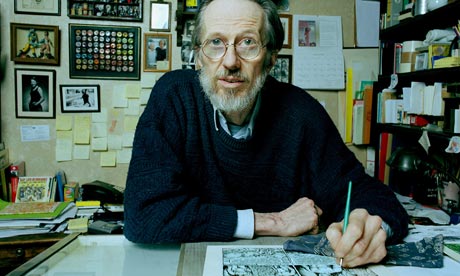
Recently I found a volume of Robert Crumb's Sketchbooks in a secondhand bookshop. Maybe I'll buy this, I thought. Then I flicked through it and after the umpteenth doodle inspired by his sexual obsession with chunky girls (this one had her hand down her pants) I decided not to bother.
This was not the first time I had opted not to bother with Crumb. Since the early 1990s I have sporadically experienced "I really should get into Crumb" attacks. I like his drawing style. Even so these attacks usually end when I remember that much of Crumb's work is actually, well, a load of crap.
Four decades after the underground comix explosion, Crumb is practically the last man standing among his peers, "... the one and only genius the 1960s underground produced in visual art, either in America or Europe" according to Robert Hughes, that perpetual bloviation machine. Poor old Spain Rodriguez, Victor Moscoso, even Gilbert Shelton – they've all been eclipsed by CRUMB, whose work hangs in prestigious galleries around the world and whose books now come to us via Norton, the respectable folk behind all those doorstopper anthologies English Lit students are obliged to buy.
Certainly Crumb was a better artist than Shelton et al, but even so I am not sure how he managed to reach this high plateau of fetishisation-deification. If you've seen Terry Zwigoff's Crumb documentary – which is a fascinating portrait of a bizarre family – you'll know the process was well underway in the mid-1990s when Crumb flogged some old sketchbooks and bought a lovely house in France with the proceeds.
You may also recall a scene in which Robert Hughes (him again) declares that Crumb is our era's Hogarth. Indeed, five years ago in the Guardian Hughes wrote a long encomium to the artist to celebrate publication of The R Crumb Handbook. That book triggered a severe "must get into Crumb" attack, so I bought it. Reading it, however, I was immediately unsurprised to rediscover that a goodly part of Crumb's output is repetitive grot featuring lassies with enormous thighs and buttocks in compromising positions with nerdy Crumb-surrogates. Yawn.
Of course, Crumb has created some memorable images. Fritz the Cat and Mr Natural piss all over your Haight-Ashbury-Summer-of-Love counterculture tosh. In this however they remind me not of Hogarth but rather early Frank Zappa records. Zappa attacked the same targets as Crumb: bourgeois hippies and The Man. I can appreciate what Zappa was up to, but those records seem really dated today.
The same goes for much of Crumb's satirical work. Perhaps to Hughes – who is an old geezer now, but was young and virile when Crumb burst on the scene – that underground work still seems timely. But I was tired of his generation's self-adoration at 15, when the BBC dedicated hours of broadcasting to Woodstock's 20th anniversary. That stomach-churning nostalgia trip has been going on for two decades now. Talk about ossification of the soul.
Perhaps Crumb moved into galleries as his original audience grew old and moneyed, although I suspect many of the rich folk collecting his cartoons had no idea who Crumb was until Hughes and co put an imprimatur of establishment respectability upon his work. Nor does Crumb conceal his contempt for these tossers. In the introduction to his Waiting for Food # 3, a collection of his restaurant placemat doodles (which I bought, dirt cheap, out of amazement that such a book could exist) he writes:
"I recently had a show of placemat drawings at a gallery in New York and some of these things sold for thousands of dollars apiece! I was flabbergasted! The foodstains on the paper … actually enhanced the value according to the gallery owner … That's the art world for you. To think I used to just walk out and leave these drawings on the table or give them to anyone who asked for them …. Guess I'm fortunate I developed these drawing skills, huh??"
Indeed you are, Bob.
None of this is to say that I think all of Crumb's work is crap. His recent rendition of Genesis looks impressive, and it may well be the Crumb book upon which I can finally end my long quest, when/if I get round to reading it.
Then again, perhaps I should have stopped searching years ago. In the early 1990s I bought Crumb's Kafka For Beginners. An excellent short introduction to its subject, thanks to Crumb's illustrations (and David Zane Mairowitz's text) it is also an almost perfect little book in its own right.
Keep on truckin'.

